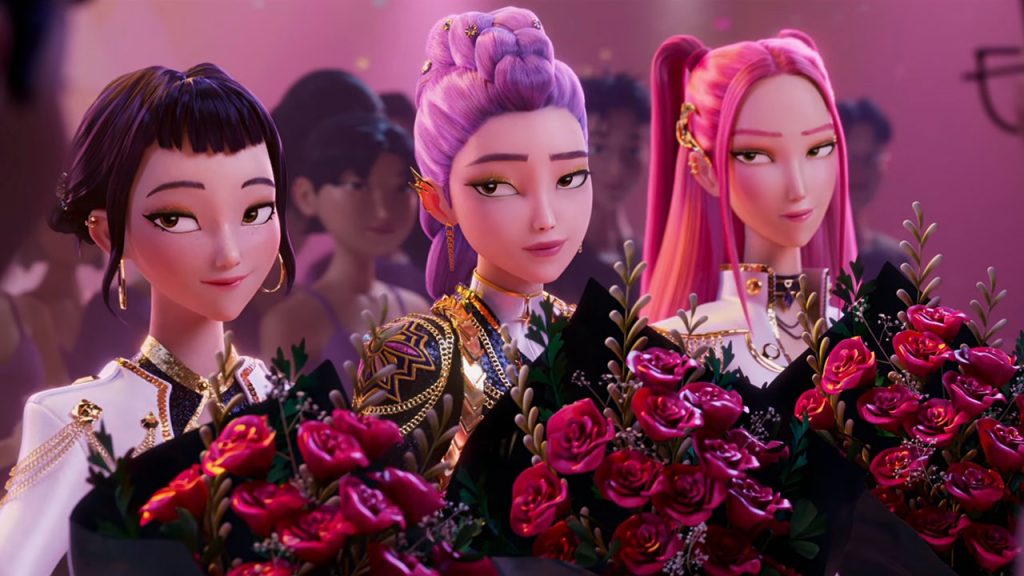Netflix has once again proven it can turn a culturally specific story into a worldwide sensation. After the meteoric rise of Squid Game and the global takeover of Money Heist, the streamer has scored another massive hit with Kpop Demon Hunter. What started as a bold animated experiment has exploded into a chart-topping global phenomenon — and now it’s officially in the conversation as a serious contender for the 2025 Academy Awards.
From Seoul to the World: A Smash Hit in 41 Countries
Kpop Demon Hunter wasted no time in making history. The animated musical adventure shot to number one in 41 countries and dominated Netflix’s global charts for four straight days. Critics praised its seamless mix of K-pop anthems, supernatural battles, and emotional storytelling. On Rotten Tomatoes, it holds an impressive 96% critic score and an 85% audience score. Even the soundtrack became a cultural force: the lead single Your Idol rocketed to number one on Spotify’s US Daily Top 50, while the full album debuted at number three on the US Billboard 200.
The Secret Weapon: “Koreanism” at Its Core
Director Maggie Kang describes the film’s secret formula as “Koreanism.” Rather than just sprinkling in cultural aesthetics, the film weaves together authentic elements of Korean folklore, shamanism, and iconic cityscapes with the glossy spectacle of K-pop. Tigers, magpies, and traditional motifs sit alongside neon stages and idol energy, creating a world that feels both uniquely Korean and universally relatable. Kang explains, “It’s powerful that a culturally Korean story was produced by an American company. It shows how far Korean culture has come — and how strong of a global force it has become.”
A Story That Cuts Deeper Than Music
Beyond dazzling visuals and catchy songs, Kpop Demon Hunter dares to explore raw psychological themes. At its heart is Rumi, a part-idol, part-demon character marked with visible scars of shame — metaphors for hidden guilt and unspoken struggles. The villains, the sinister Saja Boys, exploit these insecurities, symbolizing how internal pain can be twisted against us. The film’s core message? Confronting flaws, embracing vulnerability, and finding strength in connection. Voice actor Ahn Hyo-seop, who plays Jinu, summed it up: “We all have darkness within us. The bravest thing is facing it and trusting your own voice to move forward.”
A Reflection for the Asian Diaspora
For many in the Asian diaspora, Kpop Demon Hunter is more than a movie — it’s a cultural milestone. Audiences celebrated the unapologetic portrayal of Korean identity, with some describing it as “corrective” after growing up in environments where K-culture was dismissed or mocked. Psychology professor Paul Youngbin Kim noted that sharing the film with his family was “a healing experience that turned what once brought shame into a source of pride.” Yet, the film has also sparked debate. Some critics questioned its portrayals of Asian men, while others raised concerns of cultural borrowing after spotting similarities to Chinese traditions. Even K-pop star Wooyoung of Ateez admitted that the idol life shown was far from reality, though he acknowledged the film’s broader cultural impact.
Beyond Controversy: A Global Conversation Starter
These discussions highlight a truth every global project faces: the fine line between cultural celebration and misrepresentation. Yet, the very fact that Kpop Demon Hunter is sparking these conversations proves its cultural weight. It’s not just entertainment — it’s pushing boundaries, inviting scrutiny, and giving voice to multiple perspectives within the Asian community.
Netflix’s Global Strategy, Perfected
The runaway success of Kpop Demon Hunter is no accident. It’s part of Netflix’s bigger blueprint: invest heavily in hyper-localized stories, then amplify them to global audiences. With Maggie Kang at the helm and Netflix’s deep pockets behind her, the film delivers both authenticity and cinematic polish. Its crossover appeal spans K-pop stans, animation fans, and families alike. And with Oscar buzz already surrounding it, the film could become a historic moment — not just for Netflix, but for Korean storytelling on the global stage.
Why Kpop Demon Hunter Matters
At its core, the film represents a new era of global cinema. It proves that meaningful, culture-driven stories can travel the world without losing their soul. Whether you connect with its supernatural battles, its emotional depth, or its irresistible K-pop soundtrack, Kpop Demon Hunter embodies a powerful truth: the future of entertainment belongs to stories that are unapologetically local, yet universally human.


